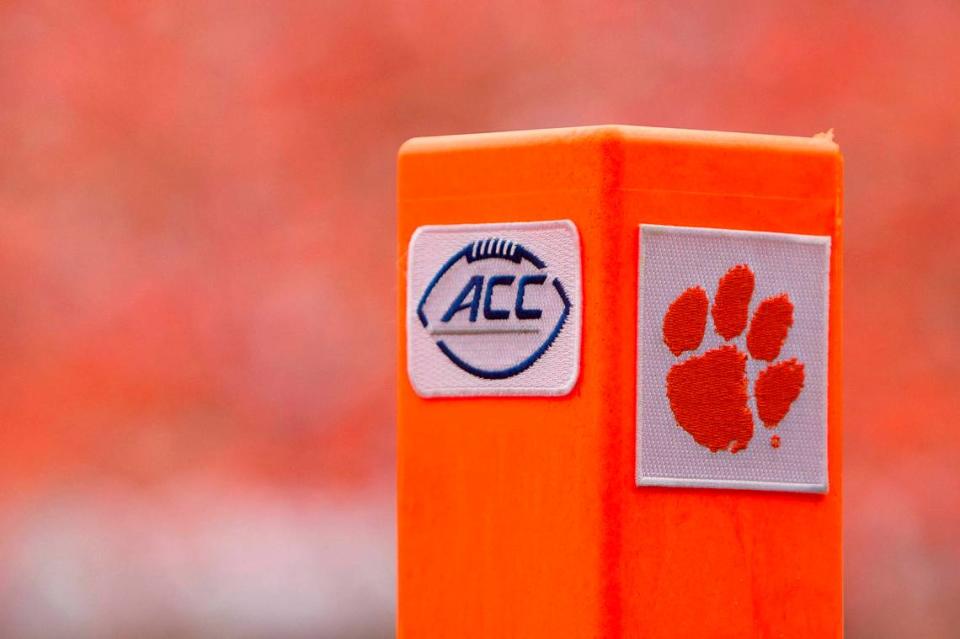The latest on ACC vs. Clemson lawsuit over grant of rights in Charlotte
A North Carolina judge on Tuesday morning promised to issue rulings on two motions in the ACC vs. Clemson case playing out in Charlotte before those two parties face each other again next week in South Carolina in a similar case.
The pending decisions by North Carolina Business Court chief judge Louis A. Bledsoe III will resemble another step in the dueling lawsuits and could provide some clarity on where they will ultimately be heard, a key first step in the legal process.
After hearing roughly an hour of arguments from both sides on Tuesday morning, Bledsoe committed to issuing rulings on Clemson’s motion to dismiss the ACC’s lawsuit and Clemson’s motion to stay the ACC’s lawsuit by late next week.
Clemson sued the ACC in Pickens County, South Carolina (where it’s located), on March 19, challenging the conference’s “grant of rights” and large exit fee required of any school hoping to leave the ACC for another conference (something the Tigers are heavily considering amid realignment) in the case Clemson vs. ACC.
The ACC, in turn, counter-sued Clemson in Mecklenburg County, North Carolina (where its Charlotte headquarters are located) and asked a court to declare its grant of rights and exit fee were “valid and enforceable” while seeking damages from Clemson for breaching that GOR in the case ACC vs. Clemson.
There’s currently a July 12 hearing set at the Pickens County Courthouse on the ACC’s motions to dismiss and stay that case as the defendant (the same motions Clemson made for the ACC’s suit in Charlotte, in which the university is the defendant).
Bledsoe’s rulings on the two motions detailed at Tuesday’s hearings could be big news for the process heading into that hearing.
“The major task is for me to get this opinion for you all that resolves these motions, and I’ll get down to doing that and get that to you hopefully by midweek next week,” Bledsoe said during a case management conference that followed Tuesday’s hearing.
And after a brief case mgt conference, we're adjourned in ACC vs. Clemson for the day. Judge Bledsoe says his "major task" is getting both parties a ruling on Clemson's motions to dismiss and stay by July 10 or 11, he hopes. The Clemson vs. ACC hearing in SC is set for July 12
— Chapel Fowler (@chapelfowler) July 2, 2024
Clemson athletic director Graham Neff was present for the hearing Tuesday at the Mecklenburg County Courthouse along with four university lawyers. The ACC brought a number of lawyers, but commissioner Jim Phillips was not in attendance for the hearing/case management conference held in uptown Charlotte.
If Bledsoe denies Clemson’s motions to dismiss and/or stay the proceedings in Charlotte, it would be a “win” for the ACC, which has argued from the start that North Carolina is the proper venue for hearing the case.
If Bledsoe rules in favor of Clemson, though, it would resemble a more unexpected “win” for the university, which has argued that South Carolina is the proper venue for the case since Clemson filed its lawsuit first and has sovereign immunity and cannot be sued outside its own state.
Legal experts polled by The State and other media outlets have found more credibility in the ACC’s argument, and the general sense is that the dueling lawsuits between the ACC and Clemson will eventually be heard (and perhaps consolidated into one case) in Charlotte. Bledsoe’s pending rulings will be a test of that theory.
Following a similar hearing in the ACC vs. Florida State case also playing out in Charlotte (the Seminoles sued the conference in December 2023, about three months before Clemson did), Bledsoe denied FSU’s motions to dismiss and stay the case and said it would continue in Charlotte.
A similar case in Leon County, Florida, though, is also continuing as a judge there ruled that Florida vs. ACC could continue in Tallahassee, too, and denied an appeal from the ACC on that front last week. Both cases remain active.
Bledsoe, during Tuesday’s hearing, struck a similar tune when it came to possibly consolidating the cases as he attempted to do in the FSU-ACC dispute.
“Why isn’t it better for one judge in one place to decide all the issues involving the very same terms of the very same contracts that animate all four lawsuits?” he asked Clemson’s representation at one point.

Inside ACC-Clemson lawsuit hearings
Although Tuesday’s hearing led to no immediate action — Bledsoe said he would not make any decisions from the bench and would distribute his opinions some time next week — it was still a revealing look into the Clemson-ACC dispute.
The State was one of only two media outlets on site for Tuesday’s hearing, which featured a Clemson slideshow with purple background and orange lettering, colorful discussion and a scene from the celebrated 1942 film “Casablanca.”
Bledsoe heard roughly one hour of arguments apiece from Clemson and ACC representation. With attorney K. Alan Parry presenting, Clemson spent roughly 30 minutes apiece arguing in favor of its motion to dismiss the case outright and stay (or halt) its proceedings while the Clemson vs. ACC case in South Carolina continues.
ACC lawyer Jim Cooney was the conference’s primary speaker during Tuesday’s hearing and spent roughly an hour laying out counter-arguments those Clemson motions (30 minutes apiece).
Parry, the Clemson lawyer, spent significant time arguing that the ACC vs. Clemson case in Charlotte should be dismissed because Clemson, as a public university affiliated with the state of South Carolina, maintains sovereign immunity (the law that a state or state agency cannot be sued out of state without consent).
Bledsoe pushed back against that argument, citing the ruling from the North Carolina Supreme Court in the related case Farmer vs. Troy University (2022), in which the court ruled that “when Troy University chose to do business in North Carolina” while knowing it was subject to a law that allowed the school to “sue or be sued” in NC, “it explicitly waived its sovereign immunity,” Bledsoe said.
“You’re gonna have to help me understand how, like Florida State, Clemson has not entered North Carolina and conducted business knowingly” under those laws, Bledsoe said.
Cooney, the ACC lawyer, added in his counter that Clemson has “engaged in commercial activity for 71 years here” as a founding ACC member and have collected “nearly half a billion dollars” from the ACC.
“And that very much is a choice,” Cooney said. “They have a right to withdraw from this conference each and every year” with a one year’s notice by Aug. 15 of any given year.
Cooney zeroed in on the fact Clemson willingly signed the ACC grant of rights in 2013 (after Maryland left for the Big Ten) and signed an extension of the GOR in 2016.
He then showed the courtroom a photo of Clemson president Jim Clements shaking hands with then-ACC commissioner John Swofford at a 2016 news conference announcing the grant of rights extension and formation of the ACC Network — and added a big, virtual circle around Clements on the screen.
“He presided over the board that approved those agreements,” Cooney said of Clements, who at the time was the chair of the ACC council of presidents. “That’s not passive. That’s not sitting back clipping coupons.”
Continuing a presentation that was more conversational and visual than Clemson’s, Cooney also played a YouTube clip from a scene in the movie “Casablanca,” in which a character, Capt. Louis Renault, insists that he’s “shocked” to hear that gambling is happening under his watch at a hotel casino before an employee approaches him with a wad of cash and kills his argument.
“Your winnings, sir,” the employee says.
Cooney compared that scene to Clemson’s argument that, under sovereign immunity, it could not be sued in North Carolina despite the university helping authorize an ACC lawsuit against Maryland in 2013.
“Clemson’s argument initially was: ‘We didn’t know we could be sued,’” he said. “Of course, they did know, because they authorized that lawsuit against Maryland.”

‘Litigation chaos’
Bledsoe, the judge, also heard an argument from Clemson that the ACC’s grant of rights did not give the conference the media rights to future home games if it left the conference, and the ACC’s counter that the GOR plainly states just that.
Parry, the Clemson lawyer, argued later in the hearing that Bledsoe should issue a stay in the ACC vs. Clemson case in Charlotte because Clemson’s case in South Carolina was filed first and is a “fair alternative” forum for the issue.
Parry also argued to Bledsoe that keeping the issue in SC court would help streamline things because “if this second case goes forward, you’re going to have cases proceeding in multiple forums, wasted judicial resources, time and expenses for both parties and a real risk of having to wrangle with ... inconsistent rulings.”
Bledsoe said he agreed with the concept but saw Charlotte as a logical venue for the Clemson-ACC dispute as well as the FSU-ACC dispute, bringing up the concept of further lawsuits.
“If Georgia Tech decides to sue down in Georgia and Virginia sues in Virginia and Syracuse sues in New York and Pittsburgh sues in Pennsylvania, that’s just going to be litigation chaos that there really is no judicial response for,” Bledsoe said.
Both sides also presented their points of view on an early 2024 email exchange between Clemson and ACC lawyers that preceded Clemson’s lawsuit, in which the two sides discussed the possibility of a non-disclosure agreement (NDA) and legal “standstill” following the FSU case.
Parry, the Clemson lawyer, said a February 2024 email from another lawyer representing the university at the time about the possibility of a legal “standstill” was “absolutely not a promise or an assurance (of no legal action)“ and rather simply an acknowledgment that the school was receptive to working on language for a “standstill” agreement of sorts.
“They argued repeatedly that it was Clemson asking for this assurance,” Parry said of the ACC. “The emails suggests the contrary. There’s certainly no evidence of that.”
ACC lawyer Cooney, in his response, said that “Clemson was free to sue us” in January 2024 before the two sides exchanged emails about a potential legal “standstill” (which, obviously, didn’t happen).
The conference argued a “misdirection” claim, saying that Clemson deceived the ACC by engaging in dialogue for a possible “standstill” before going silent on that front March 1 and suing the conference March 19.
“Their mind may have changed, and they’re entitled to change their mind,” Cooney said. “But once they engaged, once they sent this kind of message, they had an obligation to say something if they were no longer interested.”
Bledsoe pushed back against that assertion, asking Cooney: “Should the ACC at some point have assumed from the lack of communication from Clemson that Clemson was no longer interested in continuing conversations?”
“I don’t think so,” Cooney said, noting how legal correspondence can take a weeks on each end and he anticipated a delay in Clemson’s response, since a lawyer representing Clemson left his firm the same day that Cooney sent a March 1 follow-up email about “standstill language.”
“Clemson did not have an obligation to pick up the phone and say, ‘All right, Jim, we’re going to sue you on March 19,’” Cooney said. “But they had an obligation to speak if suddenly they didn’t want to talk about an NDA or a standstill.”

What’s next?
After a roughly two-hour hearing and a short break on Tuesday, Bledsoe, the judge, also held a case management conference that lasted under three minutes.
Both sides, at that point, had already expressed their wishes for Bledsoe to issue an opinion on Clemson’s motions some time before they met again in South Carolina on July 12, and said they had nothing more to add to their arguments from earlier.
Bledsoe nodded and adjourned court in Charlotte just before noon.

 Yahoo Sports
Yahoo Sports 
